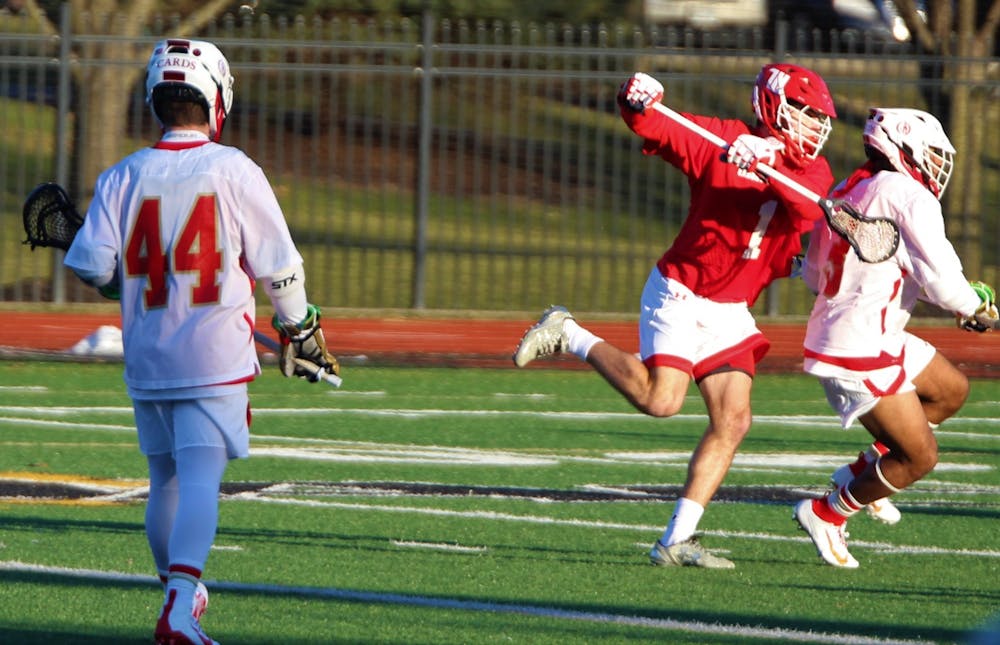The music from the loudspeaker at the top of Otterbein University’s Memorial Stadium dies off until there is nothing but the humming of noise from the unplugged auxiliary cord filling the air. Thirty college student-athletes straggle into the nets that surround the field. Tears flow down their faces, and many have already had their eyes turn bloodshot from crying. From the other side of the field, the remaining twenty members of the team walk towards them. The two groups meet at the Cardinal in the center of the field. No words are exchanged. They all hug. For Otterbein senior systems engineering major Tommy Kolibash, this will be his last time on the field.
On March 27, 2020, the National Collegiate Athletics Association (NCAA) penned a letter on their website that cancelled the rest of all winter sports tournaments and the rest of the spring sports seasons. This put an immediate stop to all team gatherings, practices and games. For teammates around the country, this will be the last time they see one another. For players like Kolibash, this is the end of a long journey that began so long ago.
“I got my first stick when I was in second grade and I never looked back,” Kolibash said. “The relationships I’ve built from lacrosse have grown into so much more than just being teammates.” Kolibash paused for a moment, his eyes glistening, and a smile broke out across his face. “The sport has had such a large impact on my life that I can’t express it in words. The guys I’ve played with, I consider my brothers.”
Kolibash always knew that the experience would come to an end eventually, but in the million ways that he drew it up in his head, this wasn’t one of them. It was always supposed to be on a game-winning goal, or a close game in the championship. Never on a cancellation of the entire season due to a world pandemic.
Three days after their initial announcement, the NCAA published another message notifying all student-athletes that compete in Division I, II or III sports that they have received another year of eligibility. The announcement allowed for all leagues to have additional scholarships to fulfill the players that want to play another year. Division III sports do not have scholarships. There is no athletic financial aid to pay for a Division III athlete to continue playing.
“I’ve taken out student loans already and taking out more is not something I want to do,” said Kolibash.
The simple truth is that many Division III athletes cannot afford to do an extra year just to play their sport. For many, they already have a job lined up post-graduation. Kolibash will spend the next foreseeable years in Chicago, Illinois at Sherwin-Williams, a long way from a lacrosse field in Westerville, Ohio.
For Division III athletes, the extra year of eligibility does not mean as much as it does to the other divisions. It is not expected for many athletes to return for that fifth year, meaning that for coaches across the country, they do not have to plan to play against a roster that carries many players four years older than some of their team. With no roster cap on any team except for baseball, the impact of COVID-19 cancellations does not seem to be changing much for them other than the loss of hard-working groups of people who did not get their fair shot at a final season.
“The toughest part for me is knowing that I will never get that season back,” said Carter Wheat, a senior biochemistry and molecular biology major. “You watch your friends and teammates put in the work for an entire year and then don’t get to see where it would take you.”
Wheat, who will begin graduate school at The Ohio State University in the fall, cannot return next season. Life does not wait for athletes to continue to play sports. “I feel for every senior whose season was ended early, but in the end, we just have to appreciate that we were given the opportunity to play in the first place,” said Wheat.
As a freshman on the lacrosse team myself, it is heartbreaking to see a promising season end prematurely. In the end it is understood that there is something more important to face in the real world right now than playing lacrosse, but the sting of losing a season is still present. My pain is nothing in comparison to the pain that these seniors are facing. They have lost something they have worked for their entire lives in a manner that no one could predict.
Back on the field, the team of fifty young men who have poured their hearts into the game they love sit around the cardinal in the center of the field. Tears still paint their faces, and everyone still embraces this final moment. It is not the senior day that many imagined when they began their journey four years prior, but it is the one that they receive. Surrounded by their teammates, the seniors walk off the field for the final time, and for every single one of them, they wish that they had the last month of the season that they thought was guaranteed.








